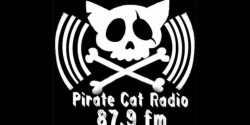I talked with attorney Michael Couzens about the case of Pirate Cat Radio and his client, Daniel Roberts. This week the FCC released an order rejecting Roberts’ petition for reconsideration of a $10,000 fine the Commission levied against him for unlicensed broadcasting.
Couzens brought to my attention a footnote (32) in the Commission’s order (PDF) that causes him concern. The footnote pertains to the FCC’s key assertion that, per quoted precedent in Campbell v U.S., the agency doesn’t have to consider only if Roberts had direct control over the transmitter broadcasting Pirate Cat’s web stream, which Roberts maintains he did not have. Much more broadly the Commission says it can consider if Roberts had “any means of actual working control over the operation of the [station] in whatever manner exercised.”
The FCC is saying that even if Roberts didn’t control the transmitter, because he appeared to operate the studio and internet stream, and because the station’s frequency was clearly advertised in places like the station’s cafe, then that’s enough to find him liable.
Couzens objects to that interpretation, noting that the precedent cited is pretty much the only case out there providing cover for that kind of broad definition for the “operation” of a station.
But there’s additional language in the footnote that Couzens calls “ridiculous and frightening.” It reads: “While Mr. Roberts may disagree with this longstanding Commission precedent, he provides no evidence that he did not exercise working control over the operation of PCR without a license.” (emphasis added).
Couzens observed, “That is standing the burden of proof on its head.” Concluding, “It’s wrong.”
Anyone with even an cursory understanding of American jurisprudence should be familiar with the phrase “innocent until proven guilty.” That means someone charged with a crime, or accused of a civil infraction, only has to defend herself against the charges. The state, or plaintiff, has the burden of proof to demonstrate that the defendant is guilty or liable. The defendant does not have the burden of proving her innocence.
Therefore it should not be the case that Roberts has to prove that he did not “exercise working control over the operation of PCR without a license.” Rather, it’s the FCC’s burden to prove that he did exercise that control.
Nevertheless, Couzens acknowledged that Roberts made things more difficult for himself. “With Pirate Cat the distinguishing factor is the whole operation was deliberately thumbing its nose at the Commission, with is press releases and svn the signage at their cafe.”
He added, “One individual was highly visible as a figurehead. As a lawyer I don’t like guilt by association. But he ascribed it to himself, even though he stated under oath that he never operated a transmitter or STL (studio-to-transmitter link).”
He stressed that he does not condone unlicensed broadcasting in any fashion. However, Couzens said, “If, against my advice, you do this, don’t poke a stick into the lair of the bear.”
I contacted Pirate Cat Radio via Facebook. The person who responded did not identify him/herself and refused to comment on the record.



